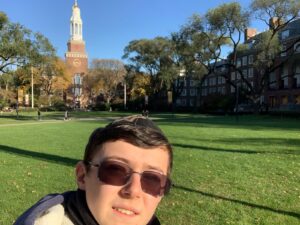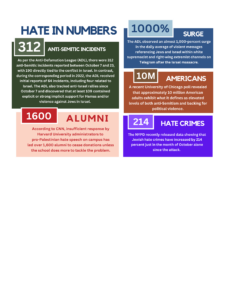Ita Yankovich
We all wait with bated breath each day for news updates from Israel. We are glued to our phones, checking WhatsApp status constantly, our hearts accelerating every time we hear that ping. Many of us sent our children to yeshivah or seminary just a few short months ago for a year of spiritual growth. A few of us have children enlisted in the Tzahal. All of us feel connected in some way to our family in Israel, our acheinu bnei Yisrael, who are in the heat of the battle with Hamas.
On another front, our American children are facing a war too: a war of words on college campuses. They may not be on the battlefield, but that doesn’t mean they are spared from the ugliness and hostility that is anti-Semitism. Whether it’s being accosted by angry protestors, remaining silent as a professor spews misinformation, or feeling the need to justify themselves for a war going on miles away, they too must be mindful of the landmines that hinder their path to class.
Going to college used to be an important rite of passage for American Jews. According to the Pew Research Center, 72% of non-Orthodox and 50% of Orthodox Jews under the age of 30 attend or have attended college. But today these institutions of learning have become fertile ground for hate rhetoric.
Fueled mostly by Students for Justice in Palestine (SJP), who have organized numerous demonstration across several American campuses nationwide, college is a place where many Jewish students no longer feel safe. It seems like every day there is another report of a hate crime occurring on a college campus nearby. In Columbia University, in addition to hostile protests occurring weekly, a Jewish Israeli student was recently assaulted. Cooper Union made the news for their pathetic display of compliance when Jewish students were advised by campus security to remain huddled in the library since no one wanted to take action against a mob of pro-Palestinian protestors who were banging on the library walls and doors trying to gain entry. More than 30 student groups at Harvard University publicly signed a proclamation declaring their allegiance to Palestine and blaming Israel for all that transpired. In an online discussion forum at Cornell, Jewish students were referred to as “excrement” and threatened with rape and beheadings.
I Refuse to Hide my Jewishness
I know a handful of Jewish students currently enrolled in NYU, Colombia, Kingsborough, and Brooklyn College. As I watch clips of pro-Palestinian protests their campuses, I often wonder how they are managing when confronted by such hate. They didn’t sign up for this when they registered to take Biology 101. They are impressionable fresh-faced yeshivah high school graduates; they are not articulate like Ben Shapiro.
I approached several students to ask about their experiences, and not surprisingly, most were reluctant to be interviewed. Only one student agreed to speak to me: Marine Park resident and Brooklyn College student Adam Davidovich.
Adam, whose family davens at Merkaz Yisrael, is a freshman who plans on majoring in chemistry. “My mother says I’m stubborn,” he says, “but I refuse to hide my Jewishness and remove kippah on campus.”
Adam’s kippah sports an IDF emblem. He explains that he wears it not to send a political message, but rather for aesthetic reasons. I ask if anyone ever taunted him for his choice and he jokes that most of the protestors probably don’t even recognize the symbol.
While an Orthodox student who volunteered during orientation inspired Adam to proudly display his heritage, he says that “It’s hard to tell who is Jewish and who isn’t on campus.” He has spotted some black hats and tzitis in halls, but visibly Jewish students are in the vast minority. He explains that most of his peers feel that it’s easier to navigate campus without the kippah; they don’t want to be singled out or stand out.
Adam hasn’t experienced any hate or bias despite his look, despite being enrolled in a class whose professor has been deemed “problematic” by other students. “I’m only a freshman,” he shares, “but from what I see so far, everyone is treating me fairly in all my classes.”

Books and Bigotry
Campus life was peaceful and uneventful before the October 7th massacre. Since that horrific day, Adam has seen protests and heard chants from groups criticizing Israel’s response to the massacre. On October 10, Jewish Brooklyn College students held a small vigil for the victims of terror. “It wasn’t political,” Adam points out. “We were there to recite Tehillim and commemorate the dead, but shortly after we began the ceremony, we were met with a counter protest, when we were even protesting!”
At the start, a lone female student stood near them with a Palestinian flag. Before long, a crowd gathered chanting “Intifada, revolution!” and “There is only one solution!” Security arrived quickly on the scene to ensure the groups remained separate.
An anti-Israel protest on October 12 had a much larger turnout and led to arrests and violent clashes with police. The protest, led by Students for Justice in Palestine, was originally set to take place on campus, in front of Ingersoll Hall, but it was moved to Bedford Avenue, in front of the school’s gates, a public space that is not under the jurisdiction of Brooklyn College. CUNY Chancellor Felix V. Matos Rodriguez issued a statement that the school “does not condone the activities of any internal organizations that are sponsoring rallies to celebrate or support Hamas’s cowardly actions. Such efforts do not in any way represent the university, and its campuses.”
Adam believes that most students protest to be part of a social movement and maybe even to score likes on their social media pages. “If they were truly adamant about their cause, they wouldn’t be concealing their faces,” he points out. “I believe it’s a case of ‘monkey see, monkey do.’” He wants to believe that the group is not acting out of malice, but that they just want to follow their friends, who are the ones spearheading the protests.
“I think most Jewish students are managing okay,” Adam says, “but I do see that some seem anxious and are a bit on edge.” He has noticed some of his peers switching from kippahs to baseball caps.

Schooled in Hate
I pose the question to Adam of why he chose to enroll at Brooklyn College instead of Touro College or Yeshiva University, and he says that Brooklyn College was his only affordable option. He also says that his parents are Brooklyn College graduates. Brooklyn College is close enough for him to bike to school each day, and he is pleased with the education he is receiving.
Brooklyn College seems cognizant of the campus tension. When I reached out to their public relations department, I was assured me that, “Brooklyn College denounces the mistreatment of any individuals or groups based on their ethnicity, religion, beliefs, or sexual orientation. The safety of the entire campus is a top college priority, as is supporting civil dialogues that enhance compassion and understanding throughout our diverse and rich campus community. ”
Adam informs me that he has gotten several emails and a few of his professors have announced that if anyone is feeling anxious or stressed, counseling services and social workers are on call to help. His English professor gave permission for the class to be absent on October 12 if they didn’t feel safe on campus. He reports that half the class was missing that. I ask Adam if he sees “Free Palestine” posters in the halls, and he says no, although he does see an occasional Palestinian flag.
To feel more secure, most Jewish students walk in groups and avoid areas that may lead to confrontation. As a Brooklyn College alumna myself, I ask him if the Jewish students still hang out in the cafeteria as they did in my day, but he says they mostly hang out at the Hillel club (of which he is a member) or at the library.
Hillel has stepped up on this front and organizes many events and drives to support Israel. It has become a haven for many Jewish students on campus. Adam attends Hillel’s “Lunch and Learn” program and is a member of their United for Israel Club, which lets students know about upcoming rallies and offers transportation.
Adam has befriended some non-Jewish classmates and says that they are all respectful. The day of the October 12 rally, his non-Jewish classmates escorted him out off campus advising him to, “Please stay safe.”
What would Adam do if faced with overt anti-Semitism? “I’d reach out to my academic advisor and program counselor,” he says. “If it’s just a matter of a professor sharing an opinion, I’d drop it and not engage as it might affect my grade.”
Adam hopes that other Jewish students will feel compelled to once again wear their kippah and tzitzit. “This will all blow over soon,” he says. “We just have to take it day by day and trust in Hashem.”
A Safe Haven in Hillel House
I reached out to the Hillel House for more information on what they are doing to make Jewish students feel safe, and the campus rabbi, Rabbi Daniel Alpert, referred me to the OU, which handles all their press inquiries. The OU said they were aware of anti-Semitic incidents and are working on supplemental security but cannot disclose specific details to the public. They acknowledged that Jewish students are being harassed, intimidated, and assaulted and that they are “supporting students across the country in a variety of social, emotional, and spiritual ways and providing heightened security for all JLIC activities.”
You must be logged in to post a comment.